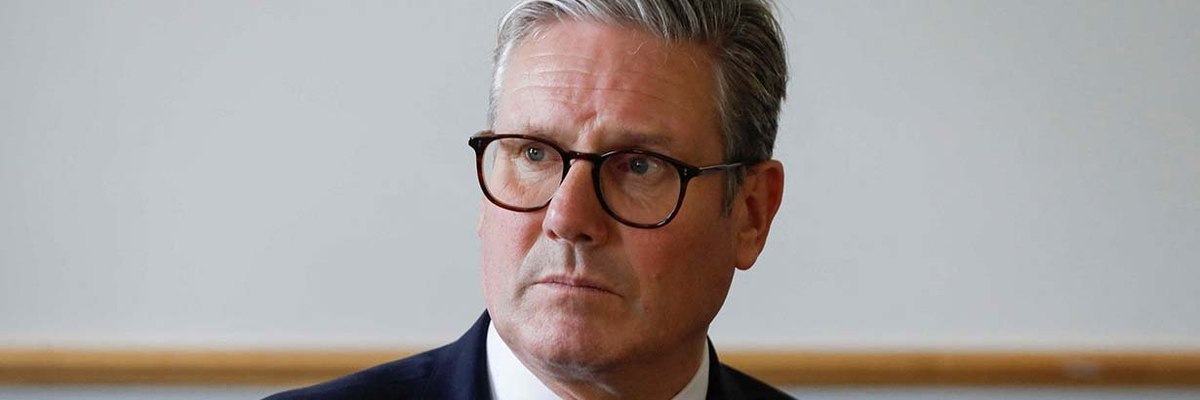While Starmer’s net favourability rating still remains higher than his pre-election figures, could his honeymoon period be coming to an end?
Having won a majority almost as large as Tony Blair’s in 1997, Keir Starmer will have been hoping to enjoy an extended honeymoon period with the British public as his predecessor did.
According to Ipsos figures, the number of people saying they were ‘satisfied’ with the way Blair was doing his job jumped from 51% prior to the 1997 election to 65% immediately afterwards. It would not consistently return to pre-election levels until the year 2000.
Keir Starmer likewise saw an increase in his favourability rating immediately following the 2024 general election. On 5-8 July we at YouGov recorded an eight point increase in the number of Britons with a positive view of Starmer since before the election, to 44%.
However, the results of our latest poll call into question whether Starmer’s honeymoon period is already be coming to an end. Four in ten Britons (40%) say they have a favourable view of the new prime minister, down four points from the previous survey on 17-18 July, while 49% have an unfavourable view, up five points.
This means that Starmer has fallen from a net favourability rating of ±0 two weeks ago - his highest post-election score - to -9 now, although this is still higher than his pre-election ratings (he scored -18 in our final poll two days before voting day).
The results follow a challenging couple of weeks for the prime minister, with the stabbings and subsequent riots in Southport, as well as public disorder in Leeds, a rebellion over the two-child benefit cap, and having to make additional spending cuts in order to plug a £22bn hole in the public finances (which also appears to have affected Rachel Reeves' ratings, see below).
Starmer’s sliding ratings come primarily at the hands of Labour voters. While the vast majority of those who backed his party still have a favourable view of Starmer, at 79%, this is an eight point drop since the election. Over the same time period, negativity towards Starmer from Labour voters has increased five points, to 15%.
By contrast, Conservative voters are actually more likely to have a favourable opinion of the man who just handed their party an electoral drubbing. One in six (18%) have a positive view of Keir Starmer, up seven points since the election. Nevertheless, 78% still hold a negative view of the Labour leader.
Other key Labour figures have also seen their popularity decline, particularly Rachel Reeves
Following her announcement of a series of cuts in order to try and plug a £22bn hole in the public finances, new chancellor Rachel Reeves’ popularity rating has taken a noticeable hit, with the number holding an unfavourable view of her rising twelve points to 37% since mid-July.
The portion of the public with a favourable view of Reeves remains largely unchanged (a one point decline to 26%), which means that the increase in unpopularity is coming from people who previously didn’t know Reeves or how they felt about her - suggesting the chancellor has made a negative first impression with many Britons.
Unlike Starmer, the decline in Rachel Reeves’ popularity ratings comes predominantly from non-Labour voters. While the number of Labour voters with an unfavourable view of Reeves did increase by five points since the previous survey, among Reform UK voters it is up 10 points, by 12 among Lib Dem voters, and by fully 25 points among Conservative voters.
Elsewhere, new home secretary Yvette Cooper has also seen an increase in negative sentiment since mid-July, from 26% to 32%. Like Reeves, the number with a positive view of Cooper remains effectively unchanged, down one point to 21%.
There have also been more minor shifts in negativity towards foreign secretary David Lammy – of whom 31% now have a negative view, up three points – and deputy prime minister Angela Rayner, whose unfavourable rating has also increased three points, to 40%.
Conservative leadership contestants: the unknown and the unpopular
Our latest favourability survey also included all six Conservative leadership contenders.
Priti Patel is the only politician in the contest that substantially more than half of the public are familiar with. This does not play into her favour – fully two thirds of Britons have a negative view of the former home secretary (67%), compared to only 16% who have a favourable view of her.
While Patel’s net score of -51 is the lowest of the entire spread, her 16% favourable figure is also the highest, ultimately a testament to how poorly known most of the field are.
Fellow former home secretary James Cleverly is the only other Tory leadership hopeful whom more than half of Britons have an opinion of – although this only amounts to 56% of people. He is likewise much more unpopular than not – 15% have a favourable view of Cleverly, but 41% have an unfavourable opinion.
Other candidates currently appear unfamiliar to the majority of the public. Kemi Badenoch, who perhaps has the highest media profile of the rest of the pack, is liked by 11% but disliked by 37%. Former security minister Tom Tugendhat, who like Badenoch stood in the summer 2022 leadership contest, is popular with 13% of Britons but unpopular with 24%.
Former immigration secretary Robert Jenrick is more disliked than liked at a rate of 27% to 8%, and former work and pensions secretary Mel Stride likewise by 18% to 4%.
Of course, the public does not get a say in the forthcoming Conservative leadership contest, which will be decided by party members. A recent YouGov survey of the party membership found Kemi Badenoch in the lead, although this was conducted before the final list was confirmed.
To look at the popularity of the candidates among 2024 Tory voters tells a very different story. In terms of net favourability there are two stand-out contestants: James Cleverly (+16) and Tom Tugendhat (+15), the only two to have net favourability ratings in the double-digits.
Overall, 42% of Tory voters have a positive opinion of Cleverly, set against 26% with a negative opinion, while 32% like Tugendhat and 17% dislike him.
Badenoch proves more divisive – while 33% of Conservative voters have a favourable view of the former business secretary, almost as many have an unfavourable view (29%).
As with the wider public, Priti Patel proves the most unpopular with Tory members. While 38% have a positive view of her – the second highest overall – this is outweighed by the 49% with a negative view, giving her a net favourability rating of -11.
Suella Braverman, who was expected to take part in the contest but declined to stand, is similarly unpopular: 34% of Conservative voters have a positive view of the former home secretary, but 47% have a negative impression.
What do you think about Keir Starmer, the new Labour government in general, and everything else? Have your say, join the YouGov panel, and get paid to share your thoughts. Sign up here.
Photo: Getty














